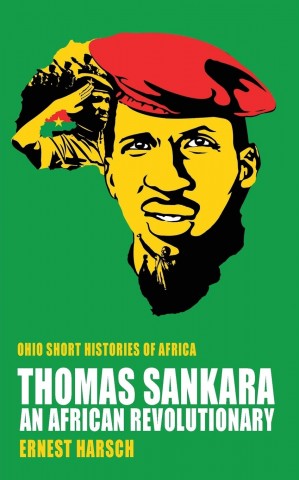Sankara, An African Revolutionary
If you have heard of Thomas Sankara but don't know much about him and his life, Ernest Harsch's "Thomas Sankara: An African Revolutionary" (2014) is a useful introduction. However, the book is quite brief (152 pages in a small sized book) - it is part of the Short Histories of Africa series. For a more detailed understanding, I would recommend the publication of his speeches and writings (which I will blog about in a future post). What this book does, which his speeches and writings do not, is provide some context, such as his time in Madagascar). Some notes:
"Sankara advanced his political education through more than books and discussions. He was able to personally witness revolutionary change. His last year in Madagascar coincided with an unprecedented period of political upheaval marked by peasant revolts, general strikes, huge public demonstrations against a conservative pro-French regime, and finally a military takeover that steadily brought ever more radical officers into high positions of power." (p. 28)
"There was little difference between colonial rule and "neocolonial society," Sankara said, except that some nationals had taken over as the agents of foreign domination. While the twenty-three years of Upper Volta's independence was "a paradise for the wealthy minority, for the majority - the people - it is a barely tolerable hell."" (p. 54)
"Although the northeast had unexploited manganese deposits, the World Bank and other donor agencies considered extension of the railway to be uneconomical, and therefore declined to fund it. The Sankara government hoped to change their minds by building an additional 100 kilometers of track from Ouagadougou to Kaya through its own financing and labor mobilization." (p. 76)
"At a time when many African leaders behaved like supplicants eager to do anything to attract Western financing, the Burkinabe government insisted that national priorities came first. As the five-year plan put it, Burkina Faso's development strategy had to "base itself on national resources, both human and material, to build the new society."" (p. 91)
"Justin Damo Barro, who was finance minister during Sankara's first year, later revealed that he had tried on four occasions to persuade the president to ask for assistance from the International Monetary Fund, but Sankara declined on the grounds that IMF "conditionality" would spell the end of the revolution, by shifting decisions over basic economic policy away from Burkinabe and toward an external entity." (p. 92)
Regarding seeking partnerships with other governments, Sankara said: "What is essential is to develop a relationship of equals, mutually beneficial, without paternalism on one side or an inferiority complex on the other." (p. 112-113)
"...many African countries originally took the loans, at steep interest rates, on the advice of Western financial experts, who ultimately bore responsibility for the mushrooming of the debt. "Those who led us into debt were gambling, as if they were in a casino. As long as they were winning, there was no problem. Now that they're losing their bets, they demand repayment." Individually, African countries would be too weak to refuse to pay, Sankara pointed out. So he proposed that African leaders stand together and create a "united front" against the debt. The OAU never followed Sankara's advice..." (p. 122)

